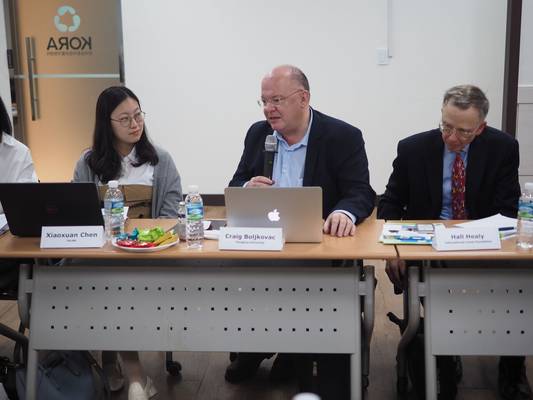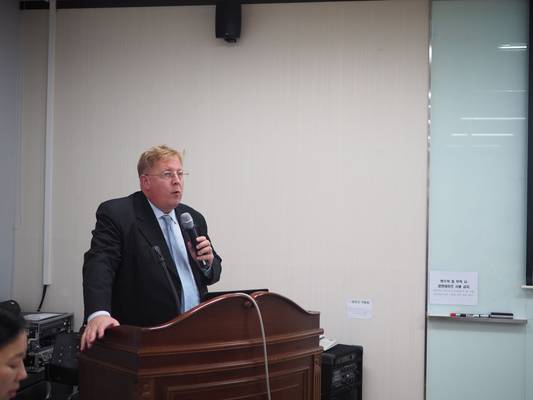Discussing experiences and potential cooperation - Workshop on Enhancing Inter-Korean Environmental Cooperation using International Networks
Craig Boljkvac, a professor at Tsinghua University
Mr. Willi Lange, Head of the Northeast Asia Department of the HSF gave welcoming remarks and emphasized the challenges of discussions between South and North Korea and wondered how the current political situation is affecting the dialogue. He concluded that while those discussions are certainly limited, they are not completely stopped and that environment is a platform for dialogue. Mr. Jong Ryool Kim, Director of the Climate and Future Strategy Division of the Ministry of Environment of Korea gave his opening remarks and emphasized the importance of the support of North Korea in environmental issues.
A self-introduction of the participants was followed by three presentations. The first presentation was titled “Suggestion for inter-Korean cooperation along the East-Asian Australian Flyway” and was given by Mr. Spike Millington from the East-Asian Australian Flyway Partnership (EAAFP). He introduced the work of the EAAFP and explained the potential of habitats in North Korea for migratory birds, specifically in the areas of Kumya and Mundok. He emphasized the impact of the EAAFP as a great platform of cooperation, as it includes many countries. North Korea could be a great addition and thus open doors for further cooperation.
Dr. Bernhard from HSS
Afterwards, Dr. Bernhard Seliger, Representative of the HSF Korea, gave a presentation titled “International Cooperation in the field of environment and wetlands- experience of the HSF”. He suggested that North Korea should be seen as a partner on the working level and explained examples of the contribution HSF has made in cooperating with North Korea. This includes an intranet website on Forestry, which has been successfully established and was supported by HSF. In addition, HSF also supported the publication of books concerning environment, organized trainings and conferences. Sangseo-ri, a model reforestation site, has proven to be very successful and has shown significant improvements of forestation in just five years. There was also cooperation in wetland issues and other fields. HSF acts as an intermediary between the Koreas. Dr. Seliger also explained ways and possibilities of cooperation. This includes the update of a national wetland inventory, establishing a Wetland Education Center, and regular surveys of the migratory birds of international importance.
The third presentation, titled “Wetland, Sustainable Development and the DPRK” was held by Mr. Felix Glenk, project manager at HSF Korea, representing Lew Young from the Ramsar Convention Secretariat. He explained how North Korea being isolated affects international environment politics. Education and awareness-raising are key factors in cooperation. He emphasized the willingness of North Korea to cooperate with international organizations. He mentioned MoLEP as a partner for cooperation in North Korea and the importance of accessing new areas, where there has not been any data collection.
In addition, Dr. Craig Boljkvac, Professor at the Tsinghua University, discussed the connection between environment and social issues in North Korea. He explained how organizations can support North Korea achieve its NDCs and gave an insight into his experiences visiting a chemical plant in North Korea. He concluded that environmental issues, when effecting humans, become humanitarian issues, thus humanitarian work can benefit the environment. In the following discussion the participants exchanged different views and opinions about environment cooperation and its possibilities in North Korea.


